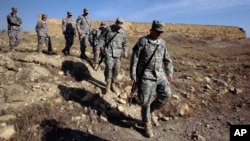Seventeen coalition member countries have sent more than 6,500 soldiers to Iraq to help in the fight against Islamic State – and the United States is calling for more.
“There is a need for that,” Patrick Martin, Iraq analyst for the Institute for the Study of War said. “There is a strong need for additional assistance, particularly with trainers.”
The numbers fluctuate, but the latest official numbers show the 6,500 plus troops spread out across four Iraqi bases in Irbil, Taji, Al Asad and Bismayah.
Special operation units are also on the ground conducting raids and collecting intelligence: Delta Force, Seals, British SAS, Canadian special forces.
As of today, according to Australian military officials, there are 300 Australian regular forces and 80 Australian special forces and 100 New Zealand regular forces in Iraq, for a total of 480 Anzac forces. None of these operate “outside the wire.”
There are also an “unspecified number” of NATO forces and an unknown number of Turkish soldiers on the ground in Iraq, according to the Congressional Research Service (CRS).
“The coalition machine in Iraq is big,” Michael Knights of the Washington Institute told VOA. “By 2011 standards, it’s tiny, but when you compare it to the standards of today, it’s pretty big.
“The real secret to this coalition is that the Canadians, Australians, New Zealand, Spanish, Portuguese, Germans, French, Italians - these people are making significant contributions,” Knights said.
U.S. Secretary of Defense Ashton Carter has reached out to some 40 nations to send additional special operations forces, trainers, combat support, weapons, and aircraft to the fight.
Lack of coordination
Currently, most coalition soldiers are training and assisting local forces - including Iraqi military, police, tribal fighters and the Kurdish Peshmerga - in everything from small unit tactics to dealing with IEDs.
But the war against IS is one of constantly shifting tactics, and more trainers are needed to keep up, as the latest battle ousting the extremists from the city of Ramadi showed.
“We had been training the Iraqi Security Forces to deal with insurgent threats, but then in Ramadi, because of the way IS had prepared its defenses, the counter-insurgency tactics needed to change more to mine-clearing and regular infantry tactics,” Martin explained.
Yet even as U.S. officials call on allies to send more trainers and personnel to help in the fight against the extremist group, some have cautioned that coalition efforts on the ground already lack coordination.
“Without a single authority responsible for prioritizing and adjudicating between different multinational civilian and military lines of effort, different actors often work at cross purposes without intending to do so,” CRS wrote in its November 2015 report to Congress.
Knights strongly disagreed. “The Americans really are the glue holding this together," he said. "There is one overarching authority, and that is Lt. General Sean MacFarland, and he is coordinating all of that. There are no western partners operating independently in Iraq.”
Knights said there were additional “loose electrons” in the Iraqi conflict theater, namely Russians, Lebanese Hezbollah and Iranian fighters, but felt they were not significant contributors.
“If you want people to stay in their thousands and pay billions of dollars to do it for you, there is nobody like the western coalition to do everything they possibly can in exchange for practically nothing, including no gratitude,” Knights said.
The Iraqi government, Knights said, was working hard behind the scenes to deconflict the area, including in Kurdistan through the Joint Coalition Coordination Center near Erbil.
“That is there to coordinate not just between the coalition and the Kurds, but the coalition, the Kurds and the federal government, to fill the gap between these two jurisdictions, particularly as war migrates in that direction,” he said.
Turkish troops
Less clear is the role of Turkish troops on Iraqi soil, which Turkish press reports have put as high as 2,000, but that analysts believe are closer to 300. According to the Turkish embassy in Washington, “there is no official number.”
“They have trainers as well as troops near Mosul,” said Jonathan Schanzer, VP for Research for the Foundation for Defense of Democracies. “One gets the sense they are trying to prevent Kurdistan from breaking away; concern about Iranian hegemony could be part of it, and their own force projection.”
Thousands of additional soldiers are spread across bases in the Middle East supporting the relentless airstrike campaign. France for example, has 200 personnel on the ground in Iraq, but more forces aboard an aircraft carrier in the Persian Gulf and multiple fighter aircraft in the air.
Schanzer warned that with so many players involved there was the risk of an even larger war.
“There are players out there who may be playing both sides against the middle,” he said. “It’s beyond a mess. It’s a nightmare. It’s very hard to walk this back.”







